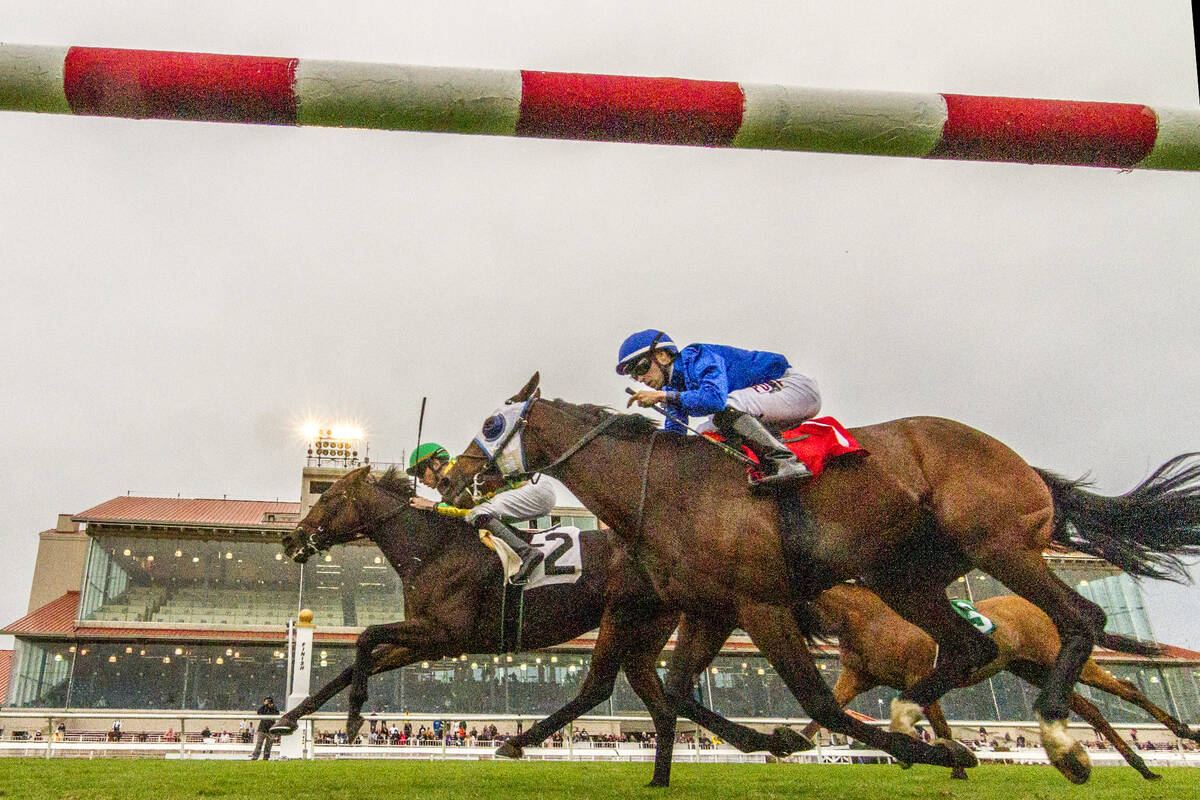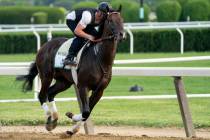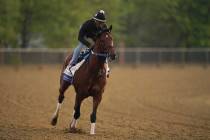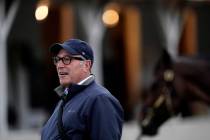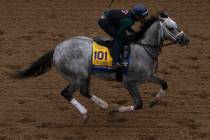Logjam breaks in Churchill Downs simulcast dispute
Christmas came early for Nevada horseplayers this week with word that a logjam had broken in the long-running simulcast dispute between the state’s racebooks and Churchill Downs Inc.
Following approval of the new contracts Wednesday by the Nevada Gaming Control Board, state racebooks are again able to offer wagering on races from the Fair Grounds, Oaklawn Park and Turfway Park beginning immediately and continuing through their current meets.
All three tracks had been off-limits in the state since last year, when Churchill Downs, the horse racing and casino company that hosts the Kentucky Derby at its namesake track, escalated an ongoing dispute with Nevada racebooks over the price of the Louisville track’s simulcast signal. Both the Fair Grounds and Turfway Park are owned by CDI, while Oaklawn Park contracts with the company for distribution of its signal.
It’s not yet clear what led to the breakthrough, though several observers pointed to the National Handicapping Championship scheduled for Jan. 28-30 at Bally’s in Las Vegas as a possible factor.
Keith Chamblin, senior vice president of marketing and industry relations of the National Thoroughbred Racing Association, which hosts the handicapping event, declined to comment on the tournament’s role, if any, in the signal agreements, but issued this statement:
“This accord is great news and an early holiday gift for Nevada horseplayers and those who qualify for the National Horseplayers Championship next January at Bally’s Las Vegas. I applaud Churchill Downs and the Nevada Pari-Mutuel Association for making this happen.”
Patty Jones, executive director of the Nevada Pari-Mutuel Association, the organization representing the racebooks in the negotiations, also said she could not comment on the breakthrough.
The contracts received Wednesday do not resolve the underlying dispute over the Churchill Downs signal, but Jones described the development as “positive movement” toward a long-term simulcasting agreement with the company.
Safety reigns at Del Mar
In addition to welcoming back fans and breaking wagering records, Del Mar set a high mark for safety at its summer and fall meets.
“The standard the track is proudest of is its continuing mark as America’s safest major racetrack,” Del Mar said in a news release Sunday after concluding its Bing Crosby season. “Only one horse was injured catastrophically in the 426 races and 3,552 starters that performed during the two sessions, a mark that is unmatched in the country.”
Obviously even one equine death is too many, but it’s clear that the safety measures taken by California’s major racetracks in the past two years have had a tremendous impact.
An ode to Pink Lloyd
Some racehorses are simply magic and Pink Lloyd was one of those.
The 9-year-old Ontario-bred gelded son of Old Forester was retired last weekend after racing for the 38th time — all at Canada’s Woodbine Race Course — and winning, as he had done on 28 previous occasions.
Though he ran at a level slightly below the sport’s elite rungs, he was a gem of consistency when placed where he belonged. Of his 29 victories over six years, 25 were in stakes races — 13 of them graded — and he amassed earnings of $1.88 million and change for owner Entourage Stable and trainer Robert Tiller. Not bad for a horse purchased for less than $30,000 at a Canadian-bred yearling sale.
I’ve seen more athletic horses than Pink Lloyd over the years, but never one gamer. Drop by LongRun Thoroughbred Retirement Society, about an hour north of Woodbine, if you’re ever in the area and pay your respects to a horse that surely earned them.
Mike Brunker’s horse racing column appears Fridays. He can be reached at mbrunker@reviewjournal.com or 702-383-4656. Follow @mike_brunker on Twitter.
Ellis Starr's Cigar Mile analysis
Olympiad is the most lightly raced horse in the field, having run just four races to date. Two were in 2020 as a two year old where he finished third before winning by nearly three lengths last summer at Saratoga. For whatever reason Olympiad was given a year off by Hall-of-Fame trainer Bill Mott, and similar to his career debut 13 months earlier the colt was a bit short of 100 percent as he finished second this September. His next race and his most recent on Oct. 14 was telling, as Olympiad controlled the pace in front from start to finish but even more notably held off a dogged rival throughout the stretch to win. Improving to a career best 106 Equibase Speed Figure from 103 one month earlier, Olympiad appears to be on a pattern to take a big step forward. Jockey Joel Rosario, who rode Following Sea to victory in the Vosburgh Stakes in October as well as rode Plainsman to win the Ack Ack Stakes that same month, has never ridden Olympiad but gets aboard for the first time. This is significant in my opinion because Rosario, whose 2021 earnings stand at $32.9 million, is on a path to break the all-time yearly record for a jockey which stands at $34.1 million. As such, every mount through the end of the year takes on added significance and so Rosario's choice of riding Olympiad in a race where the winner's share of the purse is $450,000 is yet another reason I think this colt can post the upset and win the Cigar Mile Handicap.
Ginobili enters the Cigar Mile out of the toughest last race of any in the field where he was not disgraced when second of eight in the Breeder's Cup Dirt Mile behind Life is Good. In that race, Life is Good was sent to the front on fractions which would be impossible for most horses to maintain but won by almost six lengths. Ginobili raced in fifth and fourth in the early stages before showing a burst of speed to get to second, and was even lapped on the winner before Life is Good drew off in the stretch. That effort earned a 111 figure which was rock solid. Previous to that, Ginobili earned a 110 figure effort winning the Pat O'Brien Stakes in August and shows this horse has what it takes physically and mentally to win this race.
Following Sea is another coming out of a big race, the Breeders' Cup Sprint, where he finished third of nine. Although passed in the stretch by winner Aloha West, Following Sea had some traffic issues in the race as he was on the rail on the far turn and early in the stretch but lost his path. Jockey John Velazquez, who rides again in the Cigar Mile, had to angle the horse off the rail to find a path and although the momentum Following Sea had lost earlier could not be totally regained, he did surge late to get third and earn a 107 figure. One race earlier in the Vosburgh Stakes, Following Sea earned a career-best 117 figure which is one of the best in the field. One slight question is whether he will like this one mile trip he is running for the first time as much as those two 6 furlongs sprints. Other than that, Following Sea appears to have what it takes to contend for top honors in the Cigar Mile.
The rest of the field, with their best Equibase Speed Figures: Americanrevolution (117); Code of Honor (120); Independence Hall (109); Pipeline (104); and Plainsman (107).
Ellis Starr is the national racing analyst for Equibase. Visit the Equibase website for more on the race or to purchase handicapping products.



